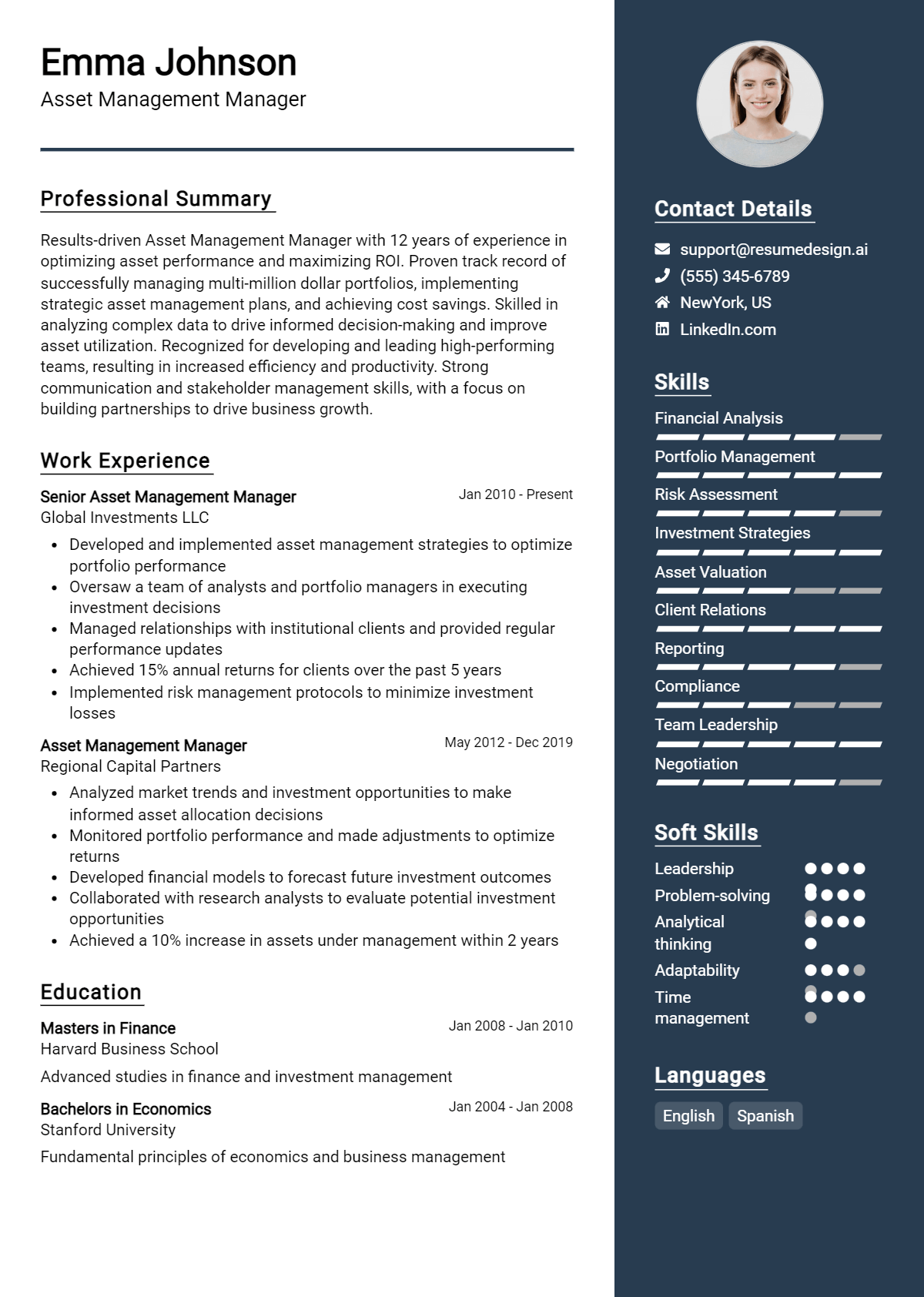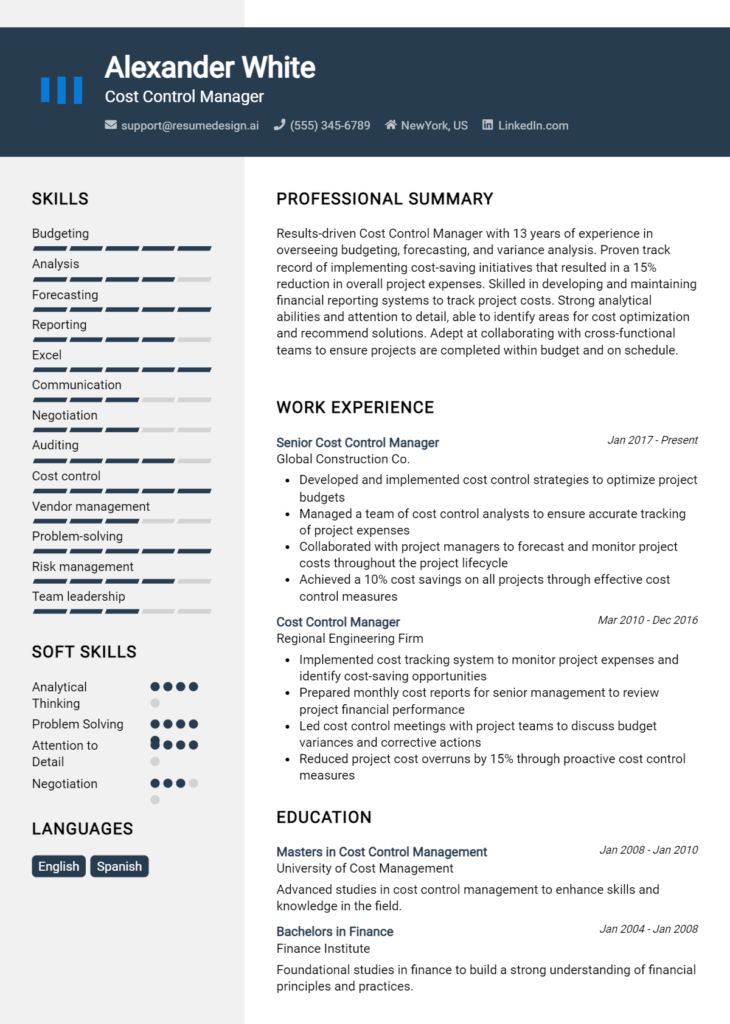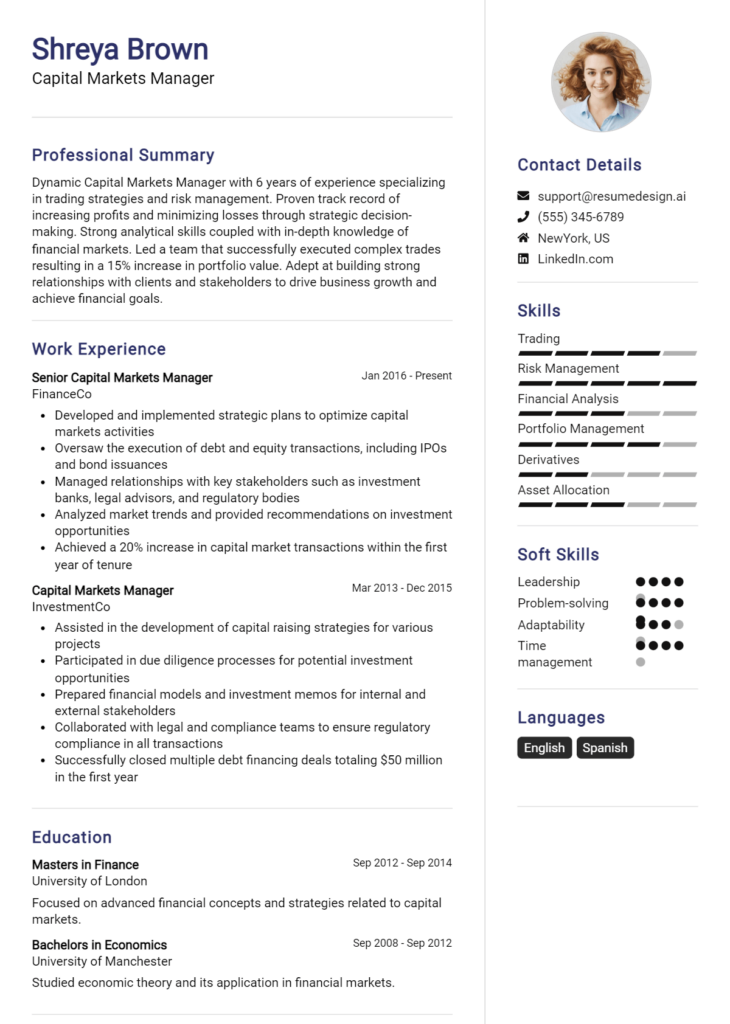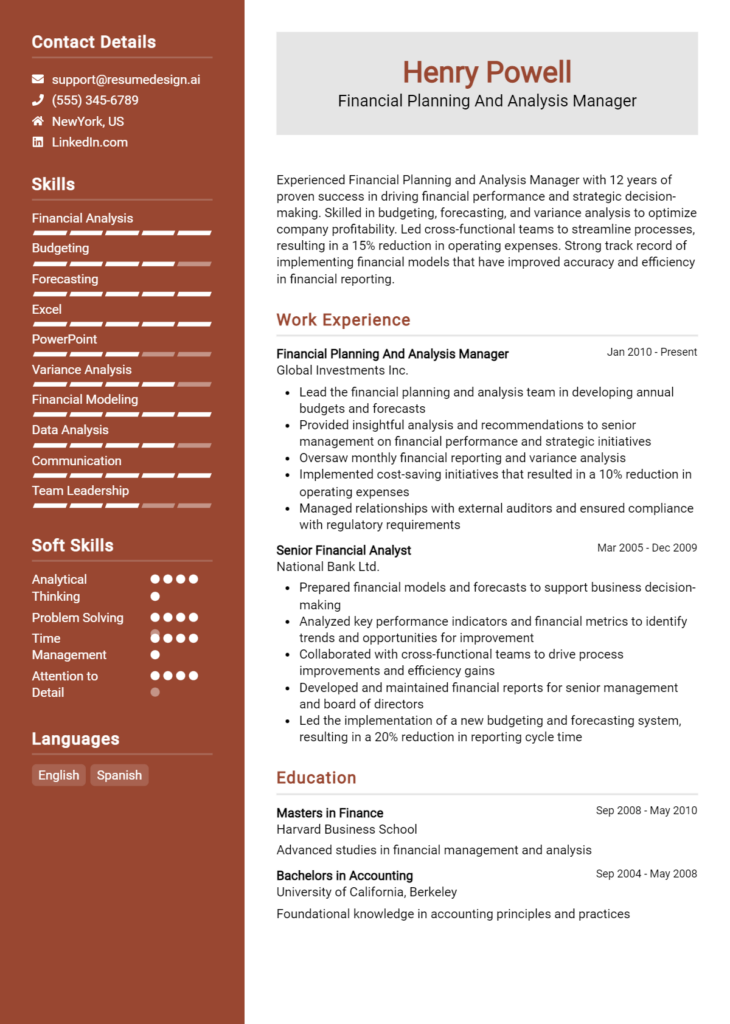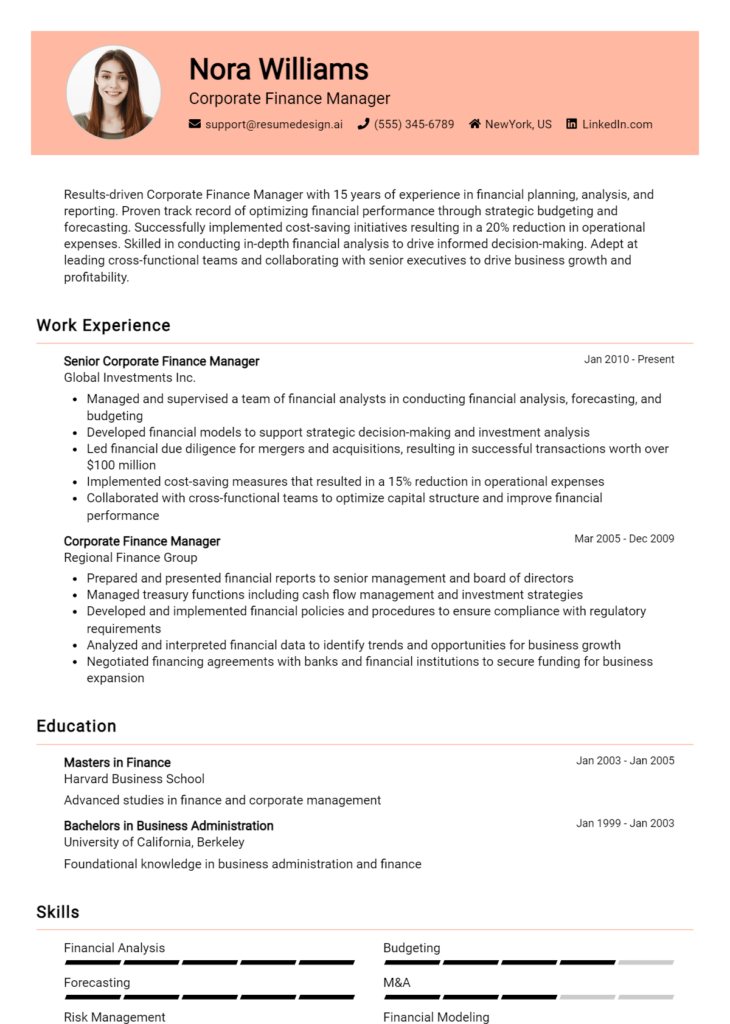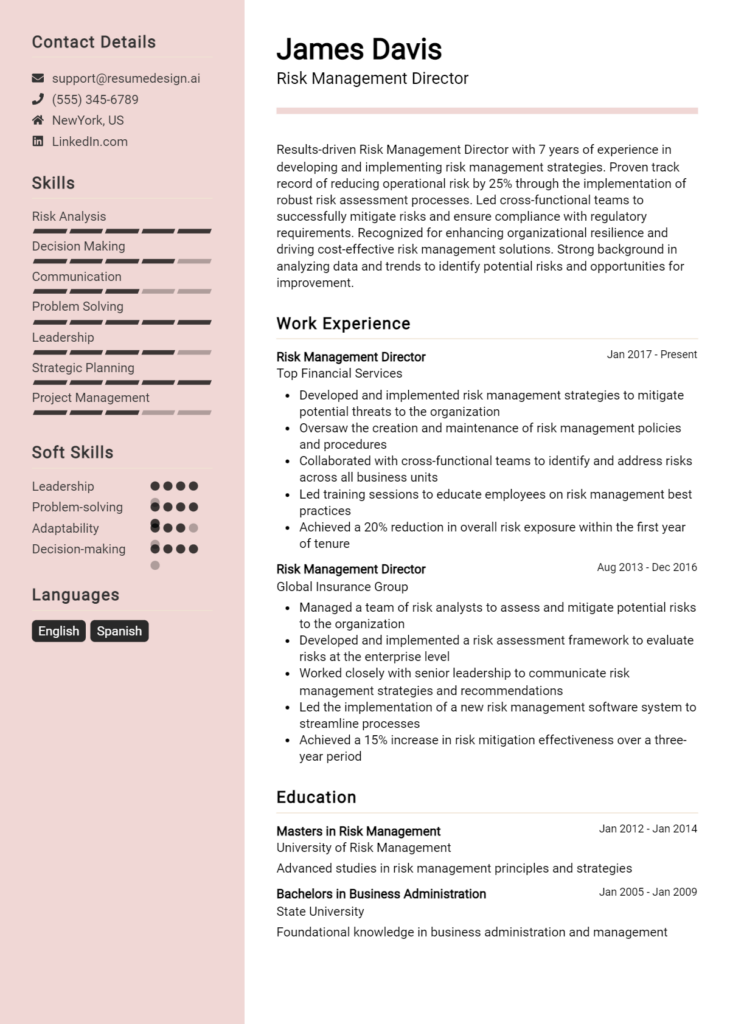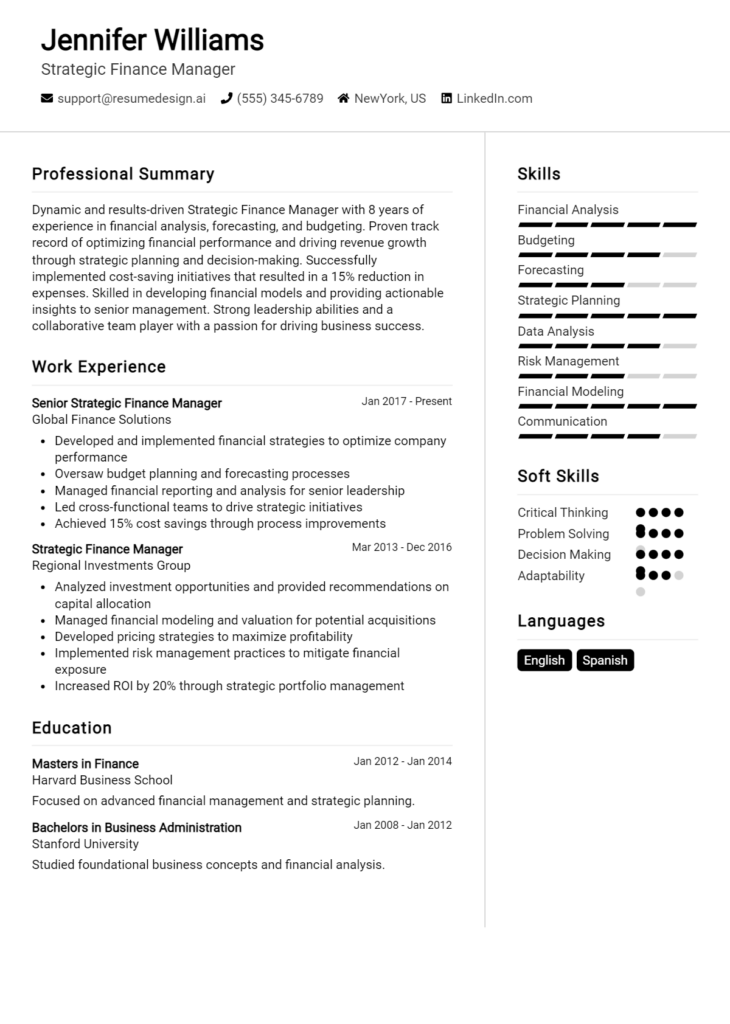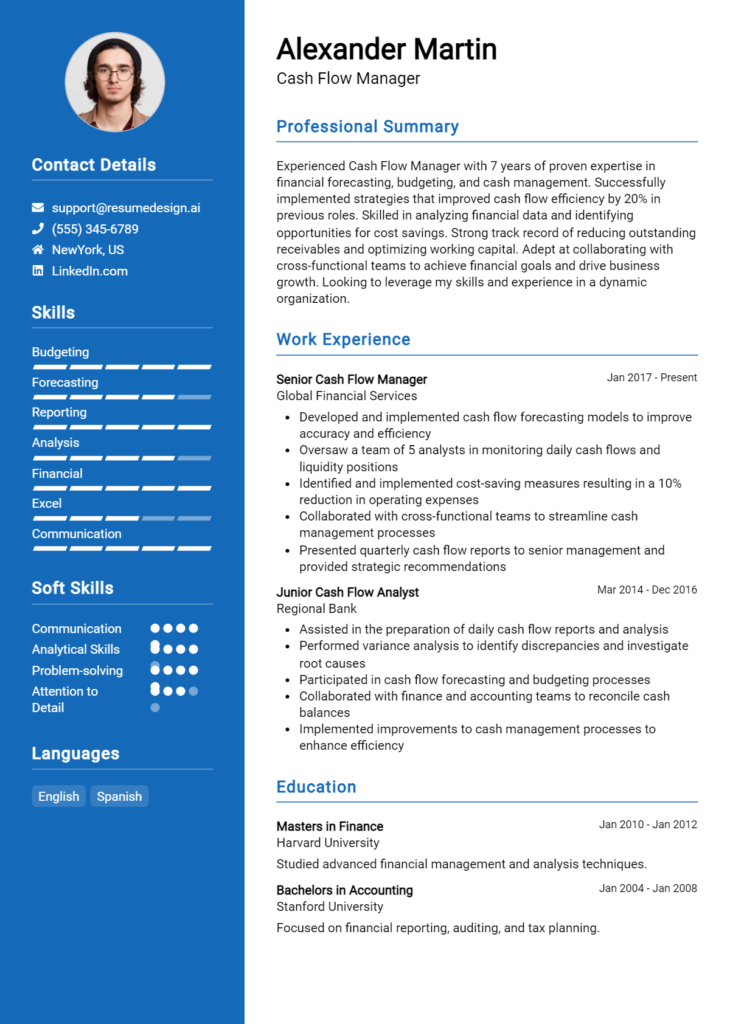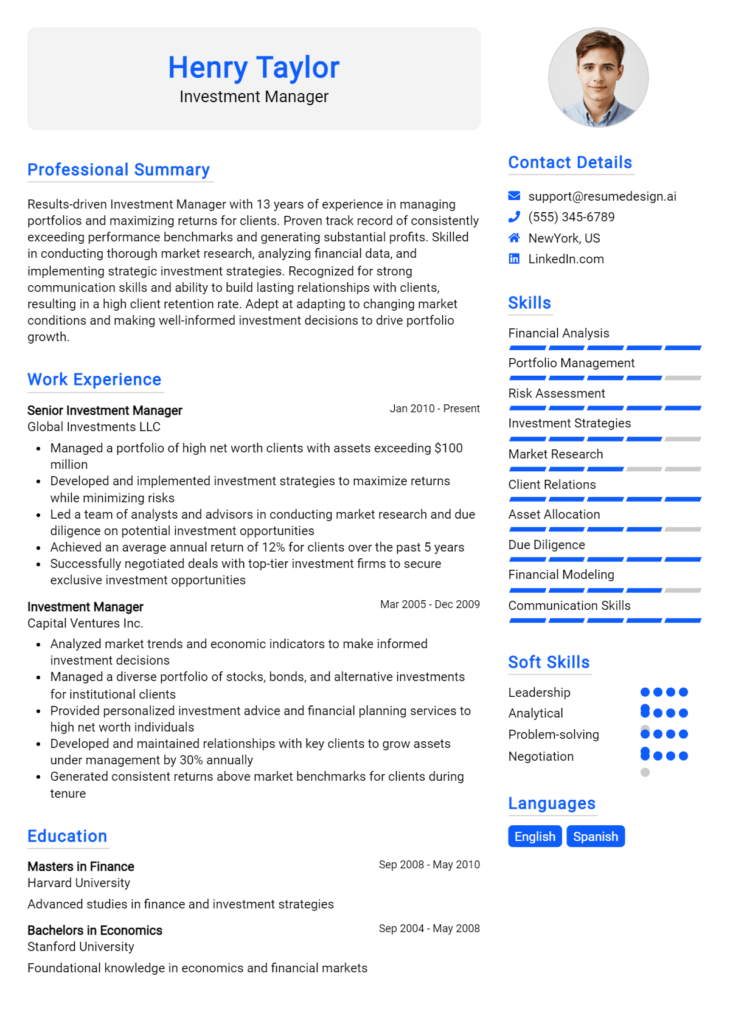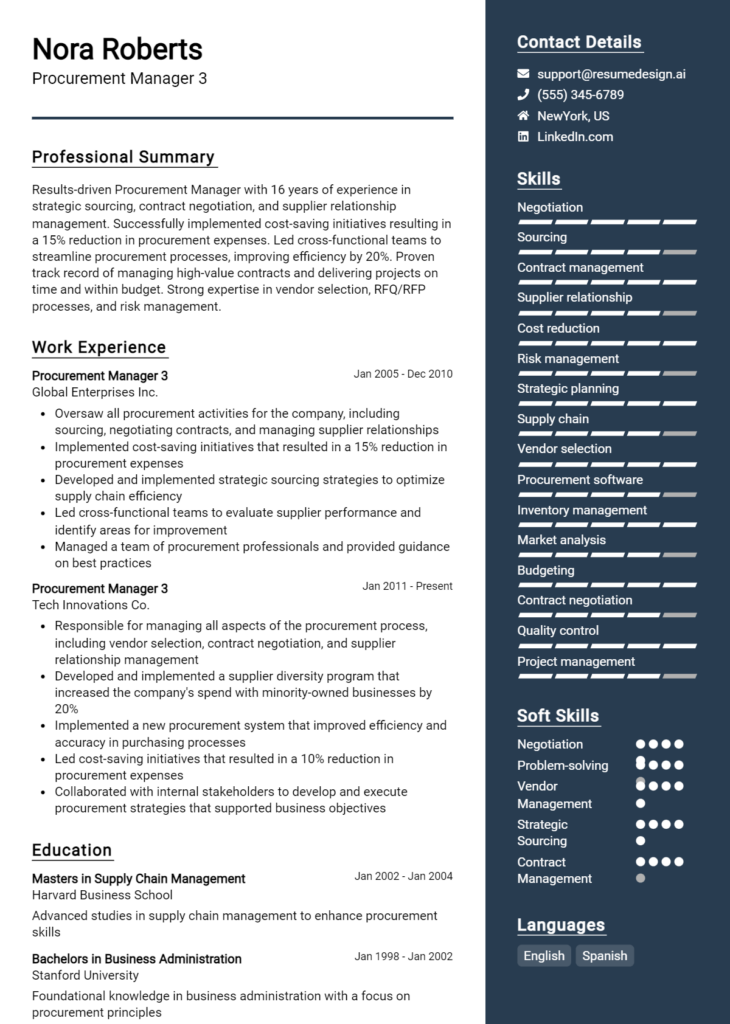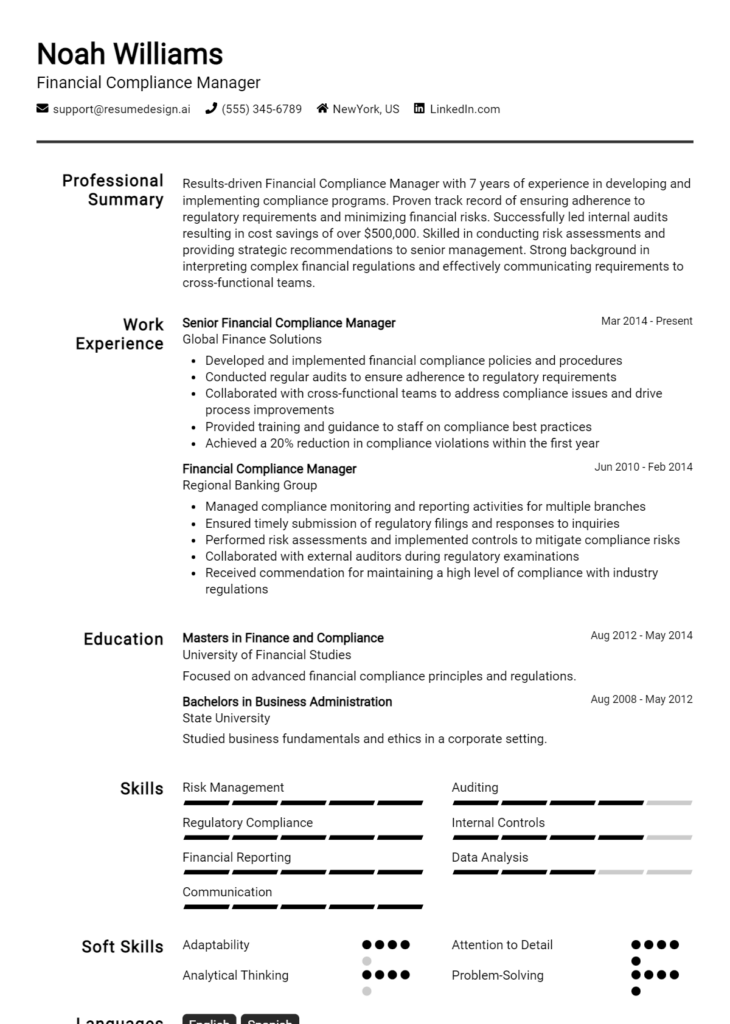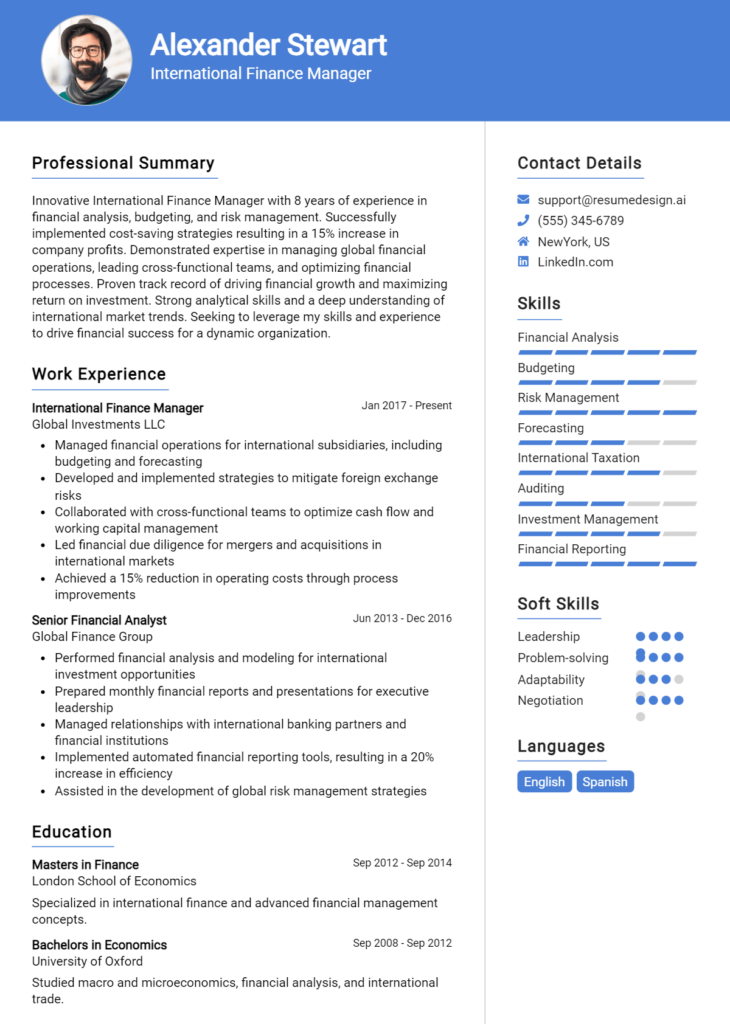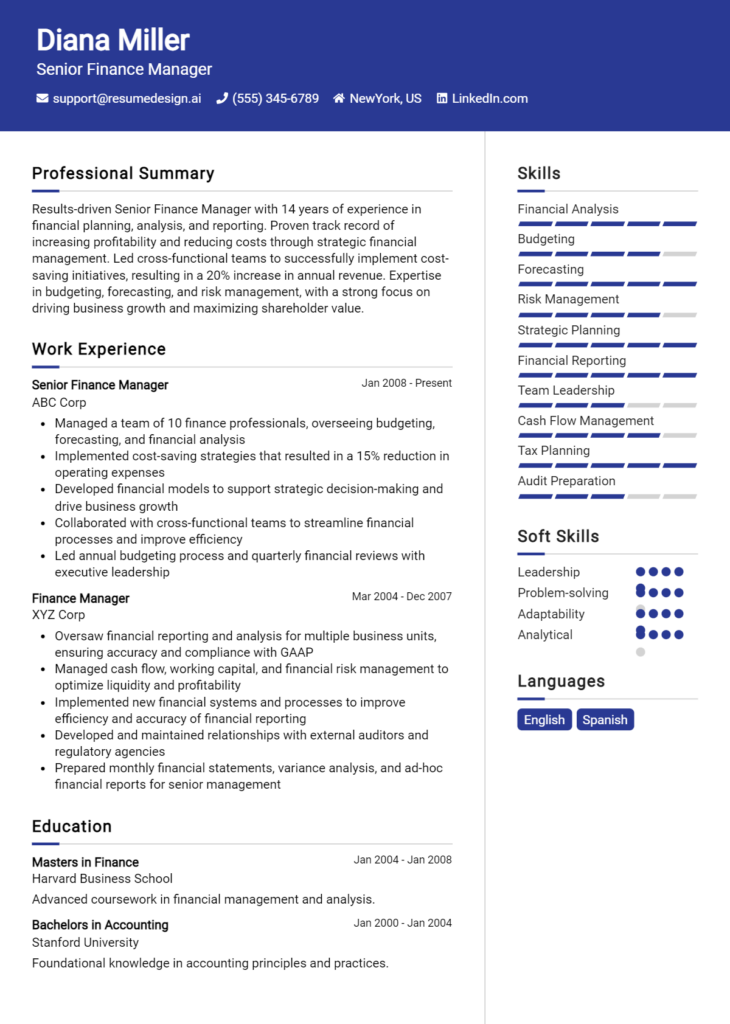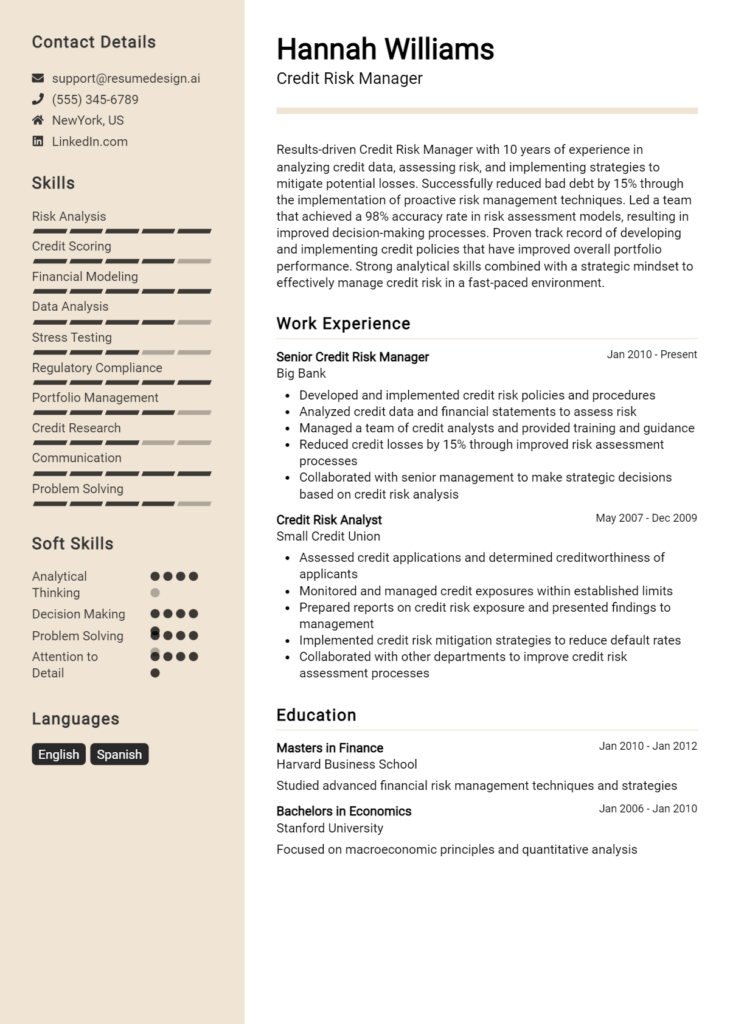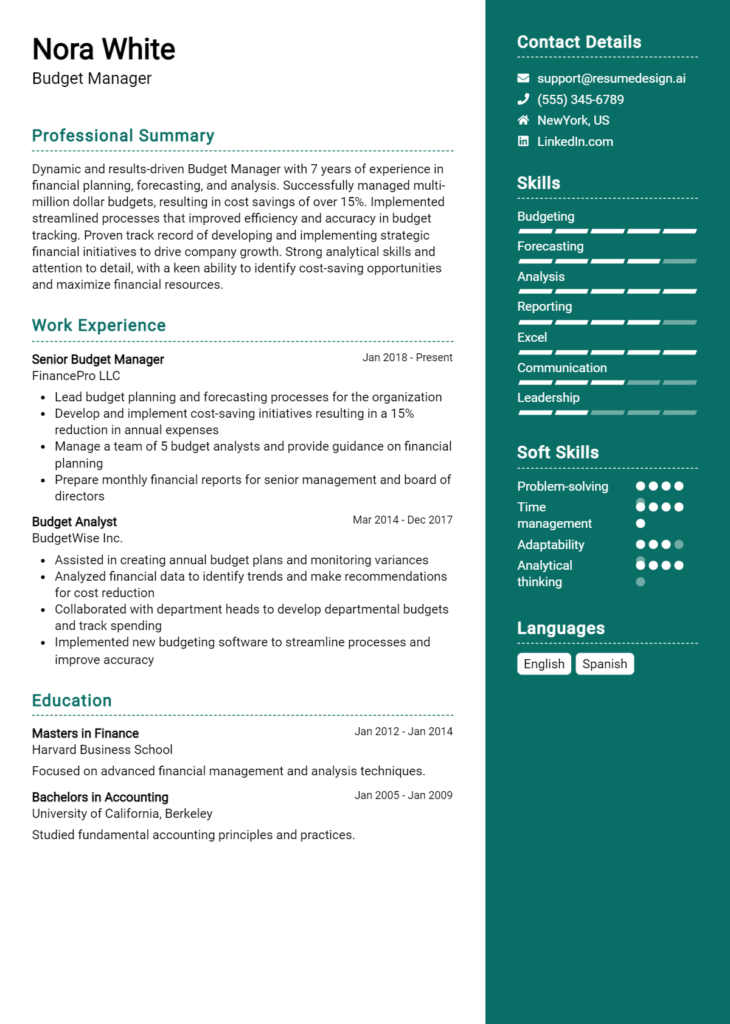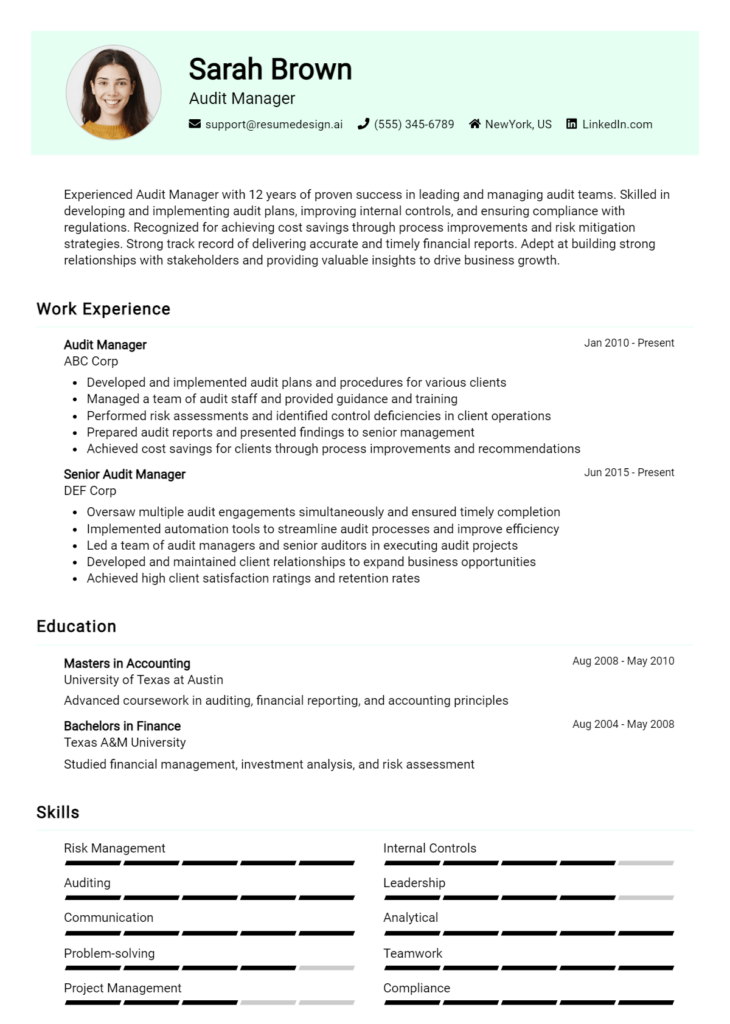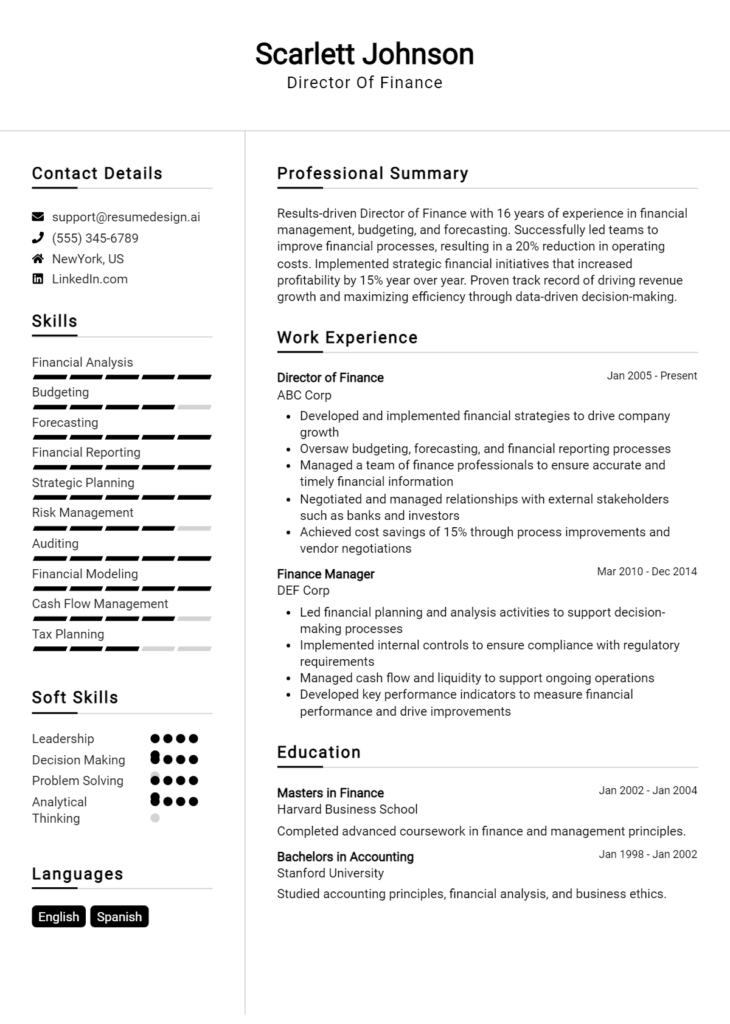Asset Management Manager Core Responsibilities
An Asset Management Manager plays a crucial role in overseeing investment portfolios and ensuring optimal asset allocation. Key responsibilities include analyzing market trends, coordinating with finance and operations teams, and developing strategies to maximize returns while mitigating risks. Essential skills for this role encompass technical knowledge in finance, operational insight, and strong problem-solving capabilities. These skills are vital in aligning departmental goals with the organization’s overall objectives. A well-structured resume can effectively highlight these qualifications and demonstrate the candidate's value to potential employers.
Common Responsibilities Listed on Asset Management Manager Resume
- Develop and implement asset management strategies to optimize portfolio performance.
- Conduct in-depth market research and financial analysis to inform investment decisions.
- Collaborate with cross-functional teams to align asset management initiatives with corporate objectives.
- Monitor and report on portfolio performance and investment risks.
- Prepare detailed investment reports and presentations for stakeholders.
- Ensure compliance with regulatory requirements and industry standards.
- Manage relationships with external asset managers and financial institutions.
- Identify and analyze potential investment opportunities for growth.
- Lead due diligence processes for new investment projects.
- Provide strategic recommendations to senior management on asset allocation.
- Train and mentor junior team members in asset management practices.
High-Level Resume Tips for Asset Management Manager Professionals
A well-crafted resume is crucial for Asset Management Manager professionals, as it often serves as the first impression a candidate makes on a potential employer. In a competitive field where attention to detail and strategic thinking are paramount, your resume must effectively reflect your skills, achievements, and industry knowledge. A strong resume not only highlights your qualifications but also demonstrates your ability to contribute to an organization’s financial success. This guide will provide practical and actionable resume tips specifically tailored for Asset Management Manager professionals, enabling you to stand out in a crowded job market.
Top Resume Tips for Asset Management Manager Professionals
- Tailor your resume to the job description by incorporating relevant keywords and phrases that match the specific requirements of the role.
- Highlight your relevant experience in asset management, including any specific sectors you specialize in, such as equities, fixed income, or alternative investments.
- Quantify your achievements by using metrics and data, such as percentage growth in assets under management or performance benchmarks exceeded.
- Showcase your knowledge of regulatory frameworks and compliance standards that impact asset management practices.
- Include industry-specific skills such as portfolio management, risk assessment, and financial modeling to demonstrate your expertise.
- Utilize a clean and professional format that enhances readability and emphasizes important information without clutter.
- Incorporate any relevant certifications or professional designations, such as CFA or CAIA, to validate your expertise.
- Demonstrate leadership and teamwork by providing examples of projects where you successfully collaborated with cross-functional teams.
- Be concise and focused, ensuring that your resume does not exceed two pages and that each bullet point adds value to your candidacy.
Implementing these tips can significantly increase your chances of landing a job in the Asset Management Manager field. By presenting a polished and targeted resume that effectively showcases your qualifications and accomplishments, you position yourself as a strong candidate ready to contribute to an organization’s success in managing and growing its assets.
Why Resume Headlines & Titles are Important for Asset Management Manager
In the competitive field of asset management, a well-crafted resume headline or title serves as the first impression a candidate makes on hiring managers. A strong headline effectively summarizes a candidate's key qualifications in a succinct and impactful phrase, instantly capturing the attention of recruiters who often sift through numerous applications. Given the importance of standing out, the headline should be concise, relevant, and tailored directly to the specific job being applied for, showcasing the candidate’s unique value proposition and demonstrating their fit for the role.
Best Practices for Crafting Resume Headlines for Asset Management Manager
- Keep it concise: Aim for clarity and brevity in your headline.
- Be specific: Tailor the headline to reflect the specific role you are applying for.
- Highlight key strengths: Include your most relevant skills or accomplishments.
- Use impactful language: Choose strong action words that convey expertise.
- Incorporate industry keywords: Use terminology that resonates within the asset management field.
- Showcase results: If possible, indicate quantifiable achievements or outcomes.
- Maintain professionalism: Ensure the tone is formal and suitable for the finance industry.
- Avoid clichés: Steer clear of overused phrases that do not add value.
Example Resume Headlines for Asset Management Manager
Strong Resume Headlines
“Results-Driven Asset Management Manager with Over 10 Years of Experience in Portfolio Optimization”
“Dynamic Asset Management Professional Specializing in Risk Assessment and Strategic Investment”
“Certified Financial Analyst with Proven Success in Maximizing Asset Performance and Client Satisfaction”
“Innovative Asset Management Leader with a Track Record of Delivering High-Impact Investment Strategies”
Weak Resume Headlines
“Experienced Manager”
“Asset Management Professional Seeking Opportunities”
The strong headlines are effective because they provide a clear and compelling snapshot of the candidate’s qualifications, emphasizing specific skills and experiences relevant to the asset management role. They use action-oriented language and highlight achievements, making a memorable impression on hiring managers. In contrast, the weak headlines fail to make an impact due to their vagueness and lack of specificity. They do not convey the candidate's unique strengths or the value they bring to the position, making them easily forgettable in a competitive job market.
Writing an Exceptional Asset Management Manager Resume Summary
In the competitive field of asset management, a well-crafted resume summary is crucial for an Asset Management Manager. This brief yet powerful section serves as the first impression for hiring managers, allowing candidates to quickly showcase their essential skills, relevant experience, and notable accomplishments. A strong summary should be concise and impactful, tailored specifically to the job the candidate is applying for. It acts as a hook that draws the reader in, providing a snapshot of the candidate's qualifications and setting the tone for the rest of the resume.
Best Practices for Writing a Asset Management Manager Resume Summary
- Quantify Achievements: Use numbers and percentages to highlight your impact in previous roles.
- Focus on Relevant Skills: Emphasize key skills that align with the job description, such as portfolio management, risk assessment, and financial analysis.
- Tailor the Summary: Customize the summary for each job application to reflect the specific requirements of the position.
- Be Concise: Keep the summary brief, ideally 3-5 sentences, to maintain the hiring manager's attention.
- Use Action Words: Start sentences with strong action verbs to convey confidence and proactivity.
- Highlight Leadership Experience: If applicable, mention any leadership roles or team management experiences relevant to the position.
- Showcase Industry Knowledge: Include any specific knowledge of asset management trends, regulations, or technologies that are pertinent to the role.
- Maintain Professional Tone: Use formal language and avoid jargon to ensure clarity and professionalism.
Example Asset Management Manager Resume Summaries
Strong Resume Summaries
Dynamic Asset Management Manager with over 8 years of experience overseeing a diverse portfolio of $1.5 billion, consistently achieving a 15% annual return on investment. Proven ability to analyze market trends and implement strategic investment strategies that maximize profitability.
Results-oriented Asset Management professional with a track record of reducing risk exposure by 20% through comprehensive portfolio analysis and proactive asset allocation. Expertise in leveraging quantitative analysis to drive informed investment decisions.
Strategic Asset Management Manager skilled in managing high-performing teams and optimizing asset performance. Successfully led initiatives that increased client satisfaction ratings by 30% while maintaining compliance with industry regulations.
Weak Resume Summaries
Experienced in asset management and finance. I am looking for a challenging role where I can apply my skills.
I have worked in asset management for several years and have a good understanding of the industry. I am a team player and can help your company.
The strong examples are effective because they provide specific metrics, demonstrate relevant skills, and articulate direct accomplishments that align with the role of an Asset Management Manager. In contrast, the weak summaries are vague and lack quantifiable results, making them less impactful and memorable, which could hinder the candidate's chances in a competitive job market.
Work Experience Section for Asset Management Manager Resume
The work experience section of an Asset Management Manager resume is pivotal as it serves as a detailed narrative of the candidate's professional journey, demonstrating their technical expertise, leadership capabilities, and commitment to delivering high-quality results. This section not only highlights the candidate's ability to manage teams effectively but also showcases their impact on the organization through quantifiable achievements. By aligning work experiences with industry standards and emphasizing measurable outcomes, candidates can illustrate their value and readiness for advanced roles in asset management.
Best Practices for Asset Management Manager Work Experience
- Use specific, quantifiable metrics to showcase achievements (e.g., increased portfolio returns by 15%).
- Highlight relevant technical skills, such as proficiency in financial modeling, risk assessment, and investment strategies.
- Demonstrate leadership experience by detailing team management, project oversight, and collaboration with stakeholders.
- Employ industry-specific terminology to align your experience with the expectations of the asset management field.
- Focus on results-driven narratives that convey how your contributions positively impacted the organization.
- Keep descriptions concise and relevant, ensuring that each point adds value to your candidacy.
- Incorporate examples of successful collaborations with cross-functional teams to illustrate teamwork and communication skills.
- Regularly update this section to reflect the most current and impactful experiences in your career.
Example Work Experiences for Asset Management Manager
Strong Experiences
- Led a team of 10 analysts in optimizing a $500M investment portfolio, achieving a 20% increase in annual returns through strategic asset reallocation.
- Implemented a new risk management framework that reduced exposure to volatile assets by 30%, enhancing overall portfolio stability.
- Collaborated with cross-functional teams to develop a financial forecasting model that improved accuracy in revenue predictions by 25%.
- Managed client relationships with key institutional investors, resulting in a 15% growth in assets under management over two years.
Weak Experiences
- Worked on various projects related to asset management without specifying details or outcomes.
- Assisted in managing portfolios, but did not quantify contributions or results.
- Participated in team meetings and discussions regarding asset strategies, with no evidence of leadership or impact.
- Completed tasks as assigned without highlighting any specific skills or outcomes achieved.
The examples classified as strong showcase clear, quantifiable achievements and demonstrate the candidate's capability in technical leadership and effective collaboration. In contrast, the weak experiences lack specificity and measurable outcomes, failing to convey the candidate's true impact or expertise in the asset management field. This distinction underscores the importance of presenting robust and results-oriented experiences in a successful resume.
Education and Certifications Section for Asset Management Manager Resume
The education and certifications section of an Asset Management Manager resume plays a crucial role in establishing the candidate's qualifications and expertise in the field. This section not only highlights the academic background of the applicant but also showcases any relevant industry certifications that demonstrate their commitment to professional development and continuous learning. By providing details on relevant coursework, specialized training, and recognized credentials, candidates can significantly enhance their credibility and align themselves with the specific requirements of the job role, making a compelling case for their suitability as an Asset Management Manager.
Best Practices for Asset Management Manager Education and Certifications
- Focus on relevance: Include degrees and certifications that are directly applicable to asset management.
- Be specific: Clearly state the major or specialization of your degree to highlight expertise.
- Highlight advanced credentials: Prioritize industry-recognized certifications such as CFA, CAIA, or similar.
- Include relevant coursework: Mention specific courses that relate to asset management principles and practices.
- Showcase continuous education: List any recent training or workshops that demonstrate ongoing professional development.
- Order by recency: Present your educational qualifications starting with the most recent to showcase the latest knowledge.
- Use clear formatting: Ensure the section is easy to read and well-organized for quick reference by hiring managers.
- Keep it concise: Only include information that adds value and relevance to your application.
Example Education and Certifications for Asset Management Manager
Strong Examples
- Master of Business Administration (MBA) with a specialization in Finance, University of Chicago Booth School of Business.
- Chartered Financial Analyst (CFA) Level II Candidate, CFA Institute.
- Certificate in Investment Performance Measurement (CIPM), CFA Institute.
- Relevant Coursework: Portfolio Management, Financial Derivatives, and Risk Management Strategies.
Weak Examples
- Bachelor of Arts in English Literature, State University.
- Certification in Basic Computer Skills, Online Learning Platform.
- High School Diploma, Local High School.
- Outdated certification in General Business, issued in 2010.
The examples listed as strong are considered relevant and impactful because they directly align with the qualifications and knowledge necessary for an Asset Management Manager role. They demonstrate a solid academic foundation in finance, along with recognized certifications that enhance the candidate's credibility. On the other hand, the weak examples lack relevance to the field of asset management, showcasing outdated or unrelated credentials that do not support the candidate's fit for the position.
Top Skills & Keywords for Asset Management Manager Resume
As an Asset Management Manager, the ability to showcase the right skills on your resume is crucial for standing out in a competitive job market. Employers seek candidates who not only possess technical expertise but also demonstrate strong interpersonal capabilities. A well-crafted resume highlights both hard and soft skills, providing a comprehensive view of your qualifications. These skills reflect your ability to manage assets effectively, analyze market trends, and collaborate with stakeholders, making it essential to tailor your resume to emphasize these competencies. To aid in your preparation, understanding the top skills relevant to the role can significantly enhance your chances of landing an interview.
Top Hard & Soft Skills for Asset Management Manager
Soft Skills
- Leadership
- Communication
- Problem-solving
- Analytical thinking
- Team collaboration
- Negotiation
- Time management
- Adaptability
- Client relationship management
- Decision-making
- Strategic thinking
- Emotional intelligence
- Conflict resolution
- Networking
Hard Skills
- Financial modeling
- Portfolio management
- Risk assessment
- Asset valuation
- Market analysis
- Investment strategies
- Regulatory compliance
- Performance measurement
- Data analysis
- Accounting principles
- Financial reporting
- Technology proficiency (e.g., Bloomberg, Excel)
- Quantitative analysis
- Research methodologies
- Asset allocation strategies
For further details on how to effectively integrate these skills into your resume, or how to highlight your work experience, be sure to explore additional resources that can guide you in creating a standout application.
Stand Out with a Winning Asset Management Manager Cover Letter
Dear [Hiring Manager's Name],
I am writing to express my interest in the Asset Management Manager position at [Company Name], as advertised on [where you found the job posting]. With over [X years] of experience in the finance and investment sectors, coupled with a strong educational background in finance and asset management, I am confident in my ability to contribute effectively to your team and help drive the success of your asset management strategies.
In my previous role at [Previous Company Name], I successfully managed a diverse portfolio of assets exceeding [specific amount] while implementing innovative investment strategies that resulted in a [specific percentage] increase in returns over [time period]. My hands-on experience with risk assessment, market analysis, and client relationship management has equipped me with the skills necessary to identify lucrative investment opportunities while mitigating potential risks. I have a proven track record of collaborating with cross-functional teams to develop tailored investment solutions that meet clients' unique financial goals, ensuring high levels of satisfaction and retention.
Furthermore, my proficiency in using advanced asset management software and analytical tools allows me to streamline processes and enhance performance metrics effectively. I am passionate about staying abreast of industry trends and regulatory changes, which enables me to provide insightful recommendations and maintain compliance. I am excited about the opportunity to bring my strategic vision and analytical mindset to [Company Name], where I believe I can make a significant impact on your asset management initiatives.
Thank you for considering my application. I am looking forward to the possibility of discussing how my experience and skills align with the goals of [Company Name]. I am eager to contribute to your team and help drive continued growth and success in your asset management efforts.
Sincerely,
[Your Name]
[Your Phone Number]
[Your Email Address]
Common Mistakes to Avoid in a Asset Management Manager Resume
When crafting a resume for the position of Asset Management Manager, it is crucial to present your skills and experiences effectively. However, many candidates fall into common pitfalls that can hinder their chances of landing an interview. Understanding these mistakes can help you create a more compelling and professional resume that stands out in a competitive job market.
Lack of Tailoring: Failing to customize your resume for the specific job description can make it appear generic. Highlight experiences and skills that are directly relevant to the role of an Asset Management Manager.
Overly Complicated Language: Using jargon-heavy or overly complex language can confuse hiring managers. Aim for clear, concise language that effectively communicates your qualifications.
Neglecting Achievements: Simply listing job duties instead of showcasing achievements can underplay your impact. Use quantifiable metrics to illustrate how you contributed to previous employers’ success.
Ignoring Keywords: Many companies use applicant tracking systems (ATS) to filter resumes. Not including relevant keywords from the job posting can lead to your resume being overlooked.
Inconsistent Formatting: An unprofessional or inconsistent format can distract from your content. Ensure uniformity in font, bullet points, and spacing to present a polished look.
Omitting Soft Skills: Asset Management Managers require not only technical expertise but also strong interpersonal skills. Failing to include soft skills, such as communication and leadership, can make your resume less compelling.
Listing Irrelevant Experience: Including unrelated work experience can clutter your resume and dilute your qualifications. Focus on roles and responsibilities that highlight your suitability for asset management.
Neglecting Professional Development: Failing to mention relevant certifications, training, or continuous education can give the impression of stagnation. Highlight any professional development that relates to asset management to demonstrate your commitment to growth.
Conclusion
As we explored the vital role of an Asset Management Manager, it’s clear that this position requires a unique blend of analytical skills, financial acumen, and strategic thinking. Key responsibilities include optimizing investment portfolios, assessing market trends, and ensuring compliance with regulatory standards. Additionally, effective communication and relationship management are crucial, as this role often involves working closely with clients and stakeholders to align investment strategies with their financial goals.
With the dynamic nature of asset management, it's essential for professionals in this field to maintain a competitive edge. One effective way to do this is by ensuring your resume reflects your skills and experiences accurately. A well-crafted resume can distinguish you in a crowded job market and showcase your qualifications to potential employers.
We encourage you to take the time to review and enhance your Asset Management Manager resume. Make use of the variety of tools available to support you in this process. Check out the resume templates for inspiration, utilize the resume builder for a streamlined creation experience, and explore resume examples to see what works best. Additionally, don't forget to prepare a compelling cover letter using our cover letter templates to complement your resume.
Taking these steps can significantly enhance your job application, positioning you for success in your career as an Asset Management Manager. Start updating your resume today!

